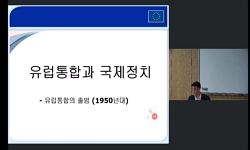유럽연합(EU)은 갈릴레오(Galileo), 유럽 지구정지궤도 위성항법보정 서비스(EGNOS), 코페르니쿠스(Copernicus), 우주 상황 인식(SSA), 정부 위성 통신(GOVSATCOM) 등의 우주 프로그램을 개발 및 운영하여 ...
http://chineseinput.net/에서 pinyin(병음)방식으로 중국어를 변환할 수 있습니다.
변환된 중국어를 복사하여 사용하시면 됩니다.
- 中文 을 입력하시려면 zhongwen을 입력하시고 space를누르시면됩니다.
- 北京 을 입력하시려면 beijing을 입력하시고 space를 누르시면 됩니다.

유럽연합의 우주력 건설에 관한 연구: 유럽연합 우주전략의 변화를 중심으로 = Research on building the EU Space Power: Focusing on the Transformation of the EU Space Strategy
한글로보기https://www.riss.kr/link?id=A109694874
- 저자
- 발행기관
- 학술지명
- 권호사항
-
발행연도
2025
-
작성언어
Korean
-
주제어
유럽연합 ; 우주전략 ; 우주력 ; 전략적 자율성 ; 우주 거버넌스 ; European Union ; Space Strategy ; Space Power ; Strategic Autonomy ; Space Governance
-
등재정보
KCI등재
-
자료형태
학술저널
- 발행기관 URL
-
수록면
295-333(39쪽)
- 제공처
-
0
상세조회 -
0
다운로드
부가정보
국문 초록 (Abstract)
본 논문은 유럽연합이 자체적인 우주력 건설을 어떻게 추진해 왔는지를 연구한다. 이를 위해 현재의 유럽연합 정책결정 시스템 내에서 각각의 우주전략의 수립 과정을 분석하기 위한 거버넌스를 설정하였다. 그리고 우주전략의 세부 과제들을 경제·산업 분야와 안보·방위 분야로 구분하여 우주력 건설의 관점에서 분석하였다.
유럽연합의 우주전략은 한국의 우주력 건설에 여러 시사점을 제공한다. 특히 산업 기반을 활용하여 제한된 자원과 역량에도 불구하고 전략적 자율성을 확보하고자 한 유럽연합의 접근은 한국이 효과적인 우주역량을 구축하기 위한 현실적인 방안 모색에 있어 하나의 선례로 볼 수 있다. 그리고 유럽연합은 우주안보와 산업 안정성을 동시에 확보하기 위한 전략으로 우주 인프라의 복원력 제고와 공급망 보호를 핵심 요소로 설정하여 자체 발사체 및 위성 제작 역량을 지속적으로 강화해 왔다. 이러한 사례는 한국이 우주산업의 공급망 안정성과 복원력을 강화해야 할 필요성을 뒷받침한다.
유럽연합(EU)은 갈릴레오(Galileo), 유럽 지구정지궤도 위성항법보정 서비스(EGNOS), 코페르니쿠스(Copernicus), 우주 상황 인식(SSA), 정부 위성 통신(GOVSATCOM) 등의 우주 프로그램을 개발 및 운영하여 유럽의 전략적 자율성에 기여하고 있다. 특히, 리스본 조약 발효 이후 확립된 현재의 정책결정 시스템을 바탕으로 유럽연합은 2011년, 2016년, 2023년 세 차례에 걸쳐 우주전략을 수립하였다. 이러한 전략문서는 유럽연합이 우주영역에서 개별 회원국의 노력, 그리고 1975년부터 오랜 역사를 가진 유럽우주기구(ESA)의 노력과 구분된다. 즉, 유럽연합의 우주전략과 자체적인 우주력 건설 노력은 유럽 전체의 복잡한 우주 거버넌스 중에서 하나의 독립적인 축을 형성하고 있다.
본 논문은 유럽연합이 자체적인 우주력 건설을 어떻게 추진해 왔는지를 연구한다. 이를 위해 현재의 유럽연합 정책결정 시스템 내에서 각각의 우주전략의 수립 과정을 분석하기 위한 거버넌스를 설정하였다. 그리고 우주전략의 세부 과제들을 경제·산업 분야와 안보·방위 분야로 구분하여 우주력 건설의 관점에서 분석하였다.
유럽연합의 우주전략은 한국의 우주력 건설에 여러 시사점을 제공한다. 특히 산업 기반을 활용하여 제한된 자원과 역량에도 불구하고 전략적 자율성을 확보하고자 한 유럽연합의 접근은 한국이 효과적인 우주역량을 구축하기 위한 현실적인 방안 모색에 있어 하나의 선례로 볼 수 있다. 그리고 유럽연합은 우주안보와 산업 안정성을 동시에 확보하기 위한 전략으로 우주 인프라의 복원력 제고와 공급망 보호를 핵심 요소로 설정하여 자체 발사체 및 위성 제작 역량을 지속적으로 강화해 왔다. 이러한 사례는 한국이 우주산업의 공급망 안정성과 복원력을 강화해야 할 필요성을 뒷받침한다.
다국어 초록 (Multilingual Abstract)
This research studies how the EU has pursued the construction of its own space power. To do so, it sets up a governance framework to analyse the formulation of each space strategy within the current EU decision-making system. The specific tasks of the space strategies are then analysed from the perspective of space power, divided into economic-industrial and security- defence sectors.
The EU space strategy has several implications for development of space power in Korea. In particular, the EU's approach to leveraging its industrial base to achieve strategic autonomy despite limited resources and capabilities can be seen as a precedent for Korea as it seeks realistic ways to build an effective space capabilities. Also, the EU has continued to strengthen its indigenous space launch vehicle and satellite manufacturing capabilities, with resilience of space infrastructure and supply chain protection as key elements of its strategy to ensure both space security and industrial stability. These cases support the need for Korea to strengthen the supply chain stability and resilience of its space industry.
The European Union contributes to European strategic autonomy by developing and operating space programmes such as Galileo, EGNOS, Copernicus, SSA and GOVSATCOM. In particular, building on the current decision-making system established since the entry...
The European Union contributes to European strategic autonomy by developing and operating space programmes such as Galileo, EGNOS, Copernicus, SSA and GOVSATCOM. In particular, building on the current decision-making system established since the entry into force of the Lisbon Treaty, the EU has produced three Space Strategies in 2011, 2016 and 2023. These strategic documents distinguish the EU's efforts in the space domain from those of individual Member States and from those of the European Space Agency, which has a long history since 1975. In other words, the EU space strategy and its efforts to build its own space force form an independent pillar of the complex space governance of Europe.
This research studies how the EU has pursued the construction of its own space power. To do so, it sets up a governance framework to analyse the formulation of each space strategy within the current EU decision-making system. The specific tasks of the space strategies are then analysed from the perspective of space power, divided into economic-industrial and security- defence sectors.
The EU space strategy has several implications for development of space power in Korea. In particular, the EU's approach to leveraging its industrial base to achieve strategic autonomy despite limited resources and capabilities can be seen as a precedent for Korea as it seeks realistic ways to build an effective space capabilities. Also, the EU has continued to strengthen its indigenous space launch vehicle and satellite manufacturing capabilities, with resilience of space infrastructure and supply chain protection as key elements of its strategy to ensure both space security and industrial stability. These cases support the need for Korea to strengthen the supply chain stability and resilience of its space industry.
동일학술지(권/호) 다른 논문
-
공항 내 구조물 설치 시 부러지기 쉬움(Frangibility) 설계 기준에 관한 고찰
- 한국항공우주정책⋅법학회
- 유태정
- 2025
- KCI등재
-
- 한국항공우주정책⋅법학회
- 이창재
- 2025
- KCI등재
-
- 한국항공우주정책⋅법학회
- 김영주
- 2025
- KCI등재
-
- 한국항공우주정책⋅법학회
- 윤나영
- 2025
- KCI등재




 KISS
KISS






